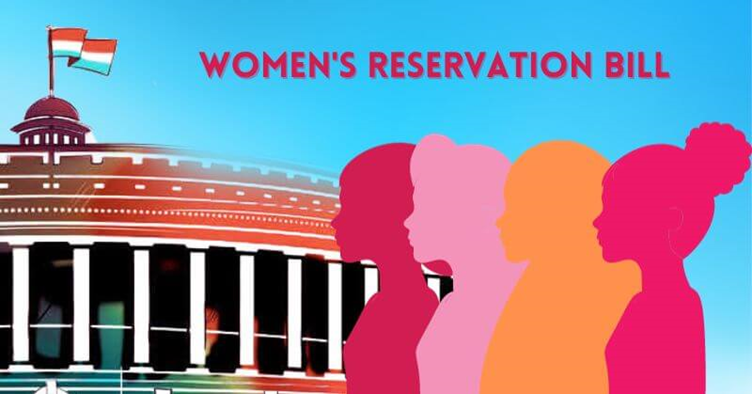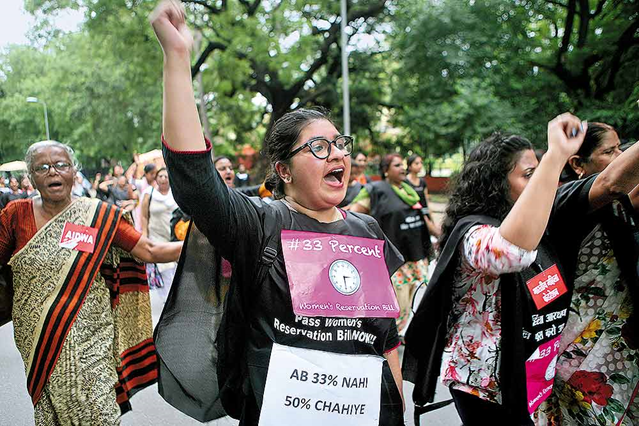WOMEN RESERVATION BILL
WRITTEN BY: GARGEE
2ND YEAR B.A.LL.B
ICFAI UNIVERSITY, DEHRADUN
EDITED BY : MUSKAN PRASAD
4TH YEAR B.A.LL.B(HONS)
AMITY LAW SCHOOL, NOIDA
INTRODUCTION
“for me, a better democracy is
a democracy where women do not only have the right to vote and to elect but to
be elected”
– Michelle Bachelet, former UN
high commissioner of Human rights.
This quote underscores the crucial role of
women's representation in the political world for the advancement of democracy.
Women should not confine themselves solely to their households, they should
step forward and take on roles in legislative bodies like the Lok Sabha and
Rajya Sabha. Moreover, gender equality is a fundamental principle in any democracy,
and this extends to political representation too. With this objective in mind,
the Women Reservation Bill, also known as the Nari Shakti Vandana Adhiniyam,
2023, was recently introduced in the Parliament on September 19, 2023. The aim
of this bill is to empower women by reserving some seats for them in the
legislative bodies.
In this blog, we
will delve into the historical background, arguments in Favor, opposing
viewpoints, challenges, and more surrounding this bill.
HISTORICAL BACKGROUND –
In December 1946,
a constituent assembly was formed for the creation of the Indian Constitution,
with Dr. B.R. Ambedkar as the chairman responsible for drafting it. The
assembly comprised a total of 299 members, including only 15 women, such as
Sarojini Naidu, Sucheta Kriplani, Vijay Lakshmi Pandit, and Rajkumari Amrit
Kaur.
During the
assembly's discussions, there was a debate on women's reservation, and
interestingly, these women members opposed it. They argued that women did not
require any special considerations.
In India, the
Union Ministry of Education and Social Welfare established a committee to
examine this issue, and the committee's report was published in 1974,
addressing the declining political representation of women in India. While a
majority of the committee members continued to oppose reservations for women in
legislative bodies, they all supported reservations for women in local bodies.
Gradually, many State governments began announcing reservations for women in
local bodies.
The National
Perspective Plan for Women, recommended in 1988, proposed that reservations be
provided to women from the level of Panchayats to Parliament. These
recommendations paved the way for the historic enactment of the 73rd and 74th
amendments to the Constitution, mandating that all State governments reserve
one-third of the seats for women in Panchayati Raj Institutions and one-third
of the chairperson positions at all levels of the Panchayati Raj Institutions
and in urban local bodies, respectively.
Within these
reserved seats, one-third are allocated to Scheduled Caste/Scheduled Tribe
women. Many States, including Maharashtra, Andhra Pradesh, Bihar, Chhattisgarh,
Jharkhand, and Kerala, have legally mandated 50% reservation for women in local
bodies.
In 1998, the
National Democratic Alliance (NDA) government reintroduced the Bill in the 12th
Lok Sabha. However, the Bill did not receive the necessary support and lapsed
again. The Bill was reintroduced in 1999, 2002, and 2003, but it consistently
failed to secure majority votes.
In 2004, the UPA
government included the reservation bill in its Common Minimum Programme and
tabled it in the Rajya Sabha to prevent it from collapsing.
In 2010, the
Women’s Reservation Bill was introduced as the 108th Constitutional Amendment
Bill. Although it was passed in the Rajya Sabha in 2008, it lapsed in the Lok
Sabha. The RJD, the JD(U), and the SP were the most vocal opponents of the
bill, as they demanded 33% reservation for backward groups within the 33% quota
for women.”
KEY FEATURES OF
THE BILL -
1. Reservation for
Women in Lower House - The bill mentions the insertion of Article 330A into the
Constitution of India for the reservation of SC/ST. The seats may be allotted
through rotation within different constituencies.
2. Reservation in
State Legislative Assemblies - The Bill introduces Article 332A, mandating the
reservation of one-third of the seats for women in every State Legislative
Assembly, and these seats must be filled through direct election.
3. Reservation in NCT
Delhi - Article 239AA(2)(b) was amended by the bill to include that the laws
framed by Parliament shall apply to the National Capital Territory of Delhi.
4. The Bill Also Adds
a New Article that states it will come into effect after the census is
conducted, and delimitation will be undertaken to reserve seats for women.
5. Period of
Reservation - The reservation will be provided for a period of 15 years;
however, it shall continue until a date determined by a law made by Parliament.
ARGUMENTS IN
FAVOUR OF THE BILL –
1. By introducing
this bill, we can break the stereotype that women can also represent themselves
as lawmakers.
2. By increasing
women's representation, the problems of women will come forward, which can lead
to women's empowerment in this patriarchal society.
3. According to the
UN University, women legislators improve the economic performance of their
constituencies by 1.8 per cent more than male legislators. The evaluation of
the Pradhan Mantri Gram Sadak Yojana shows that the share of incomplete road
projects is 22 percentage points lower in female-led constituencies.
4. Women in India
vote at par with men, but their representation is very low compared to men.
Reserved seats will bridge some gap between the vote share of women and their
representation in the parliament/assemblies.
ARGUMENTS AGAINST THE BILL
1. The bill mentions
that it will come into effect after the delimitation process, and the
reservation in Parliament will depend upon it. However, the census has been
delayed, and delimitation could be politically sensitive.
2. The bill provides
separate reservations for Scheduled Castes and Scheduled Tribes women within
the existing one-third reservation of seats. However, OBC women, constituting
60% of the female population, have not been provided a separate reservation
within the quota.
3. Women are a
heterogeneous community, unlike a caste group. As a result, the same arguments
used to justify caste-based reservations cannot be applied to justify
reservations for women.
4. The bill does not
provide for women's reservation in the Rajya Sabha and State Legislative
Councils. The Rajya Sabha currently has a lower representation of women than
the Lok Sabha. Representation is an ideal that must be reflected in both the
Lower and Upper Houses.
CONCLUSION
In conclusion, we
can say that the Women's Reservation Bill holds great significance in the
history of our country and has been a topic of debate and discussion since
India's independence. Over time, numerous changes have occurred, leading to
improved gender equality. The arguments in favour of reservations have evolved,
but they remain valid according to this bill. Women's empowerment is now a
primary concern in both society and the political world, and reservations can
be a crucial instrument to pave the way for this purpose. It appears that we will
witness women playing leading roles in the political world in the future.
References
NewsAbouT Women Reservation Bill. (2023, 10 21). Retrieved from INDIAN EXPRESS: https://indianexpress.com/about/women-reservation-bill/
SANTHANAM, R. (2023, 09 24). What will hold up
women’s reservation Bill? | Explained. Retrieved from THE HINDU :
https://www.thehindu.com/news/national/what-will-hold-up-womens-reservation-bill-explained/article67339000.ece
SHEKHAR, P. (2023, 10 05). WOMEN RERVATION BILL.
Retrieved from FORUM IAS :
https://forumias.com/blog/women-reservation-bill-explained-pointwise/#Key_Provisions_of_Women_Reservation_Bill_2023Nari_Shakti_Vandan_Ad
WOMEN RESERVATION BILL 2023 . (2023, 09 20). Retrieved from DRISHTI IAS : https://www.drishtiias.com/daily-updates/daily-news-analysis/women-s-reservation-bill-2023
#Women Reservation Bill # Women empowerment # Be the Change







Comments
Post a Comment